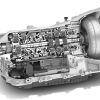
LongROAD Study Suggests Driving Can Predict Dementia With 88% Accuracy
A new study called LongROAD suggests that driving demographics can help predict possible cognitive decline with shocking accuracy. Obviously, things like Dementia and other cognitive impairments can affect driving.

Still, these new findings are using driving data to show impending impairments that could help people catch these things earlier and keep drivers across the board safer.
Can how someone driving really predict Dementia?
As machine learning becomes a more regular term in our world, it is also becoming a more useful tool in gathering data. New Atlas reports that studies on how dementia affects driving are fairly well covered. This new study is trying to get on the other side of how dementia affects driving by getting in front of it.

The basis of this study is to see if machine learning can predict dementia or other cognitive degradation by tracking someone’s driving habits. Suppose these programs are looking for patterns and driving habits that over time might show degrading cognition.
What is the “LongROAD” study?
The Longitudinal Research on Aging Drivers or “LongROAD” study tracked nearly 3,000 older drivers for up to four years, offering a large longitudinal dataset. Over the four years of the program, 33 drivers were diagnosed with mild cognitive impairment (MCI) and 31 with dementia.
In an interview with New Atlas, Sharon Di, lead author on the new study, said, “Based on variables derived from the naturalistic driving data and basic demographic characteristics, such as age, sex, race/ethnicity, and education level, we could predict mild cognitive impairment and dementia with 88 percent accuracy.”
88 percent is no small figure. The study admits that age was still the number one factor used in predicting these cognitive struggles but the driving data was a close number two.
Most of the data is made up of “the percentage of trips traveled within 15 miles (24 km) of home … the length of trips starting and ending at home, minutes per trip, and a number of hard braking events with deceleration rates ≥ 0.35 g.”
The study showed that driving data alone could predict MCI and dementia with a reported 66 percent accuracy without any age demographics.
What does this mean for aging drivers?
Overall, the study is still in its early stages. Like most studies, LongROAD will need many more participants and time to better understand the connections between the data and cognitive issues.
Maybe the most interesting aspect of the study is how it might affect cars and driving in the future. New Atlas notes that the LongROAD study might result in a smartphone app or software inside a car that will constantly monitor your driving patterns to offer clues of early detection of cognitive decline before clinical symptoms become apparent.
Senior author Guohua Li adds, “Our study indicates that naturalistic driving behaviors can be used as comprehensive and reliable markers for mild cognitive impairment and dementia…If validated, the algorithms developed in this study could provide a novel, unobtrusive screening tool for early detection and management of mild cognitive impairment and dementia in older drivers.”



